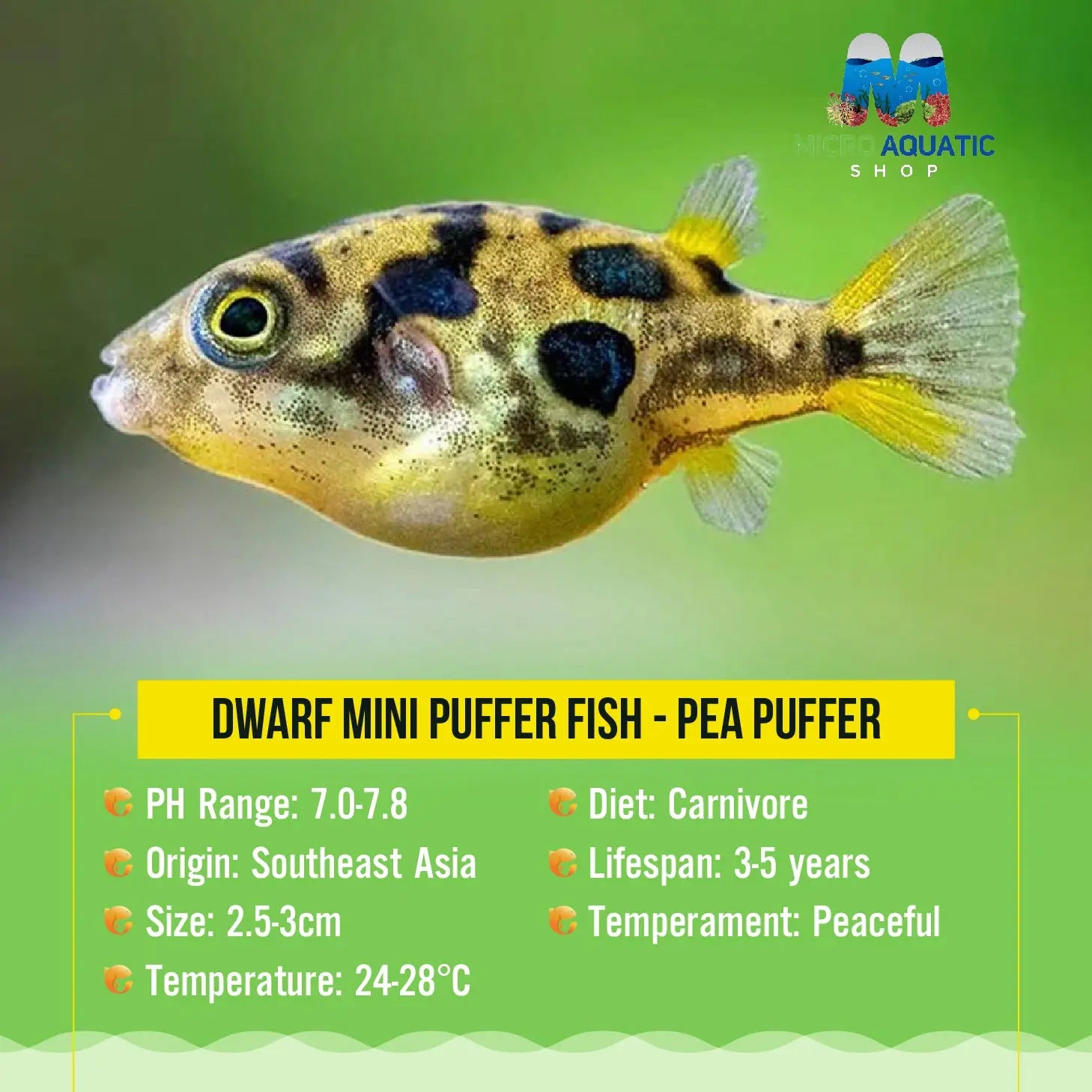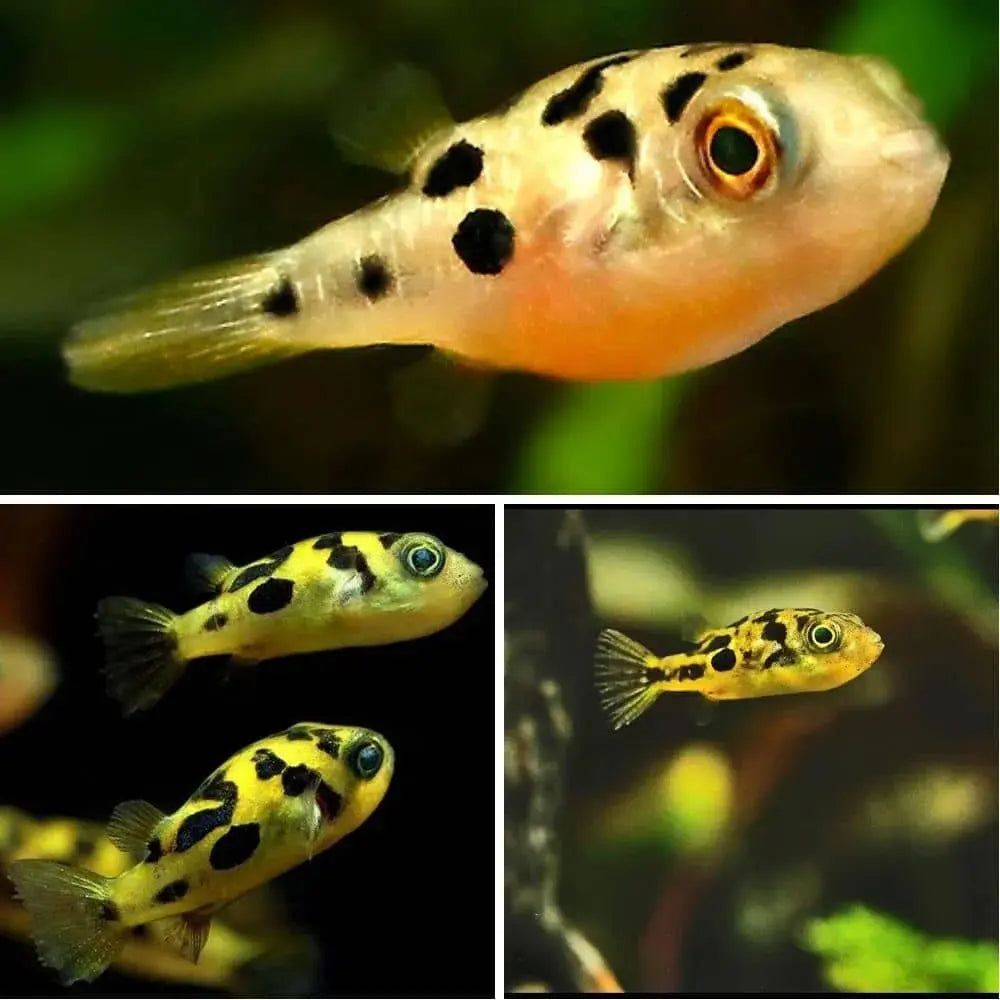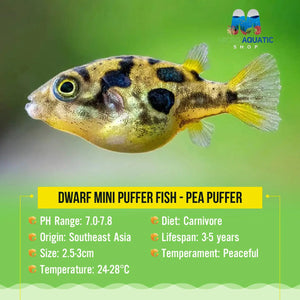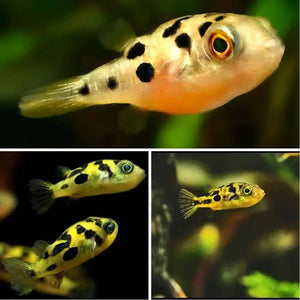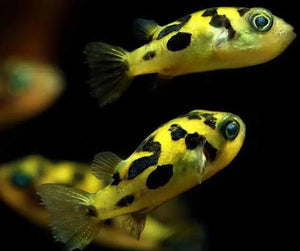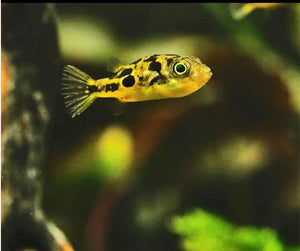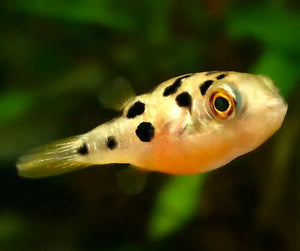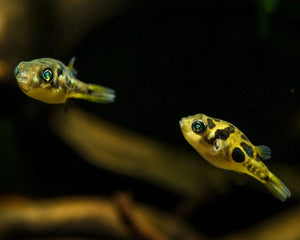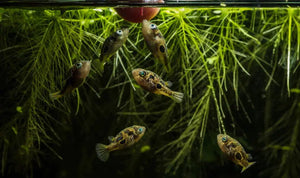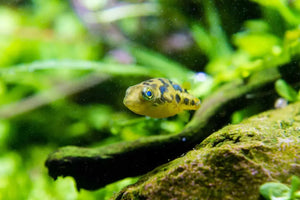Dwarf Mini Puffer Fish - Pea Puffer
Guarantee Safe Checkout
Pea Puffer Fish - Dwarf Mini Puffer for Freshwater Aquariums
Explore the enchanting world of the Dwarf Mini Puffer Fish, also known as the pea puffer. These charming freshwater puffers have won the hearts of many Australian aquarists. They are small but full of personality, making them perfect for nano tanks.  Join us as we delve into their fascinating features, care needs, and why they're great for your home aquarium.
Join us as we delve into their fascinating features, care needs, and why they're great for your home aquarium.
Key Takeaways
- Pea puffer fish are a compact and unique Dwarf Puffer species perfect for freshwater aquariums
- They are incredibly popular among Australian aquarists due to their engaging behaviour and suitability for nano tanks
- Pea puffers require specific care and tank conditions to thrive, making them a rewarding but challenging species to keep
- These fish have distinct physical characteristics, including their signature 'puffing' ability, that set them apart from other nano fish
- Proper research and preparation is essential to providing the ideal environment for your pea puffer to live a long and healthy life
Introduction to Dwarf Mini Puffer Fish, Pea Puffer
The Carinotetraodon Travancoricus, or Dwarf Mini Puffer, is a favourite among aquarium fans. Hailing from India, these small puffers are loved for their unique looks and lively nature.
Origin and Natural Habitat
Pea Puffer fish come from southern India's freshwater streams and rivers, especially Kerala. They live in slow-moving, oxygen-rich waters with lots of plants and hiding spots. It's important to mimic their natural home in a freshwater aquarium to keep them happy and healthy.
Physical Characteristics
These tiny fish are known for their small size, growing up to 2.5 to 3 inches long. They have a round body, beak-like teeth, and bright colours. Their colours can be olive-green to brown, with interesting patterns.
Behavior Patterns
Pea Puffers are curious, playful, and smart. They can puff up when scared and like to play with their owners. They do best in small groups, so it's key to understand their behavioural patterns for the best care in a freshwater aquarium.
Setting Up the Perfect Puffer Tank Environment
Creating the ideal habitat for our beloved Dwarf Puffer Fish is key to their health and happiness. As peaceful community fish, Pea Puffers need specific conditions in their freshwater aquarium. Let's explore the essentials to ensure your Dwarf Puffer Fish thrives.
Tank Size and Dimensions
Pea Puffers are small but hate being crowded. We suggest a tank of at least 10 gallons (38 litres) for one puffer. Add 5 gallons (19 litres) for each extra fish. They prefer horizontal space for swimming, not just depth.
Water Parameters
- pH: 6.5 - 8.0
- Temperature: 72°F - 82°F (22°C - 28°C)
- Hardness: 5 - 19 dGH
- Regular water changes (25% weekly) are crucial for water quality.
Filtration and Aeration
A good hang-on-back or canister filter is vital for clean water. Pea Puffers also like gentle water movement. Adding a small powerhead or air stone helps with oxygen.
Suitable Tank Mates
Pea Puffers do well with calm tank mates. Good friends include small, peaceful fish like tetras, rasboras, and corydoras catfish. Stay away from aggressive or fin-nipping fish to avoid stress or injury.
| Ideal Tank Mates | Unsuitable Tank Mates |
| Tetras | Cichlids |
| Rasboras | Barbs |
| Corydoras Catfish | Guppies |
| Otocinclus Catfish | Fancy Goldfish |
By following these tips, you'll create a great home for your Dwarf Puffer Fish in your freshwater aquarium.
Feeding and Dietary Requirements
Caring for puffer fish, especially the unique freshwater puffers, requires a keen understanding of their dietary needs. These small aquatic creatures have specific nutritional requirements. Meeting these needs is crucial for their long-term health and wellbeing.
Live Food Options
Pea puffers are carnivorous and thrive on a varied diet of live foods. In Australia, some excellent live food options include:
- Bloodworms
- Brine shrimp
- Daphnia
- Small aquatic snails
Frozen Food Alternatives
While live foods should form the basis of a puffer's diet, frozen alternatives can also be a convenient and nutritious supplement. Some recommended frozen foods for puffer fish care include:
- Frozen brine shrimp
- Frozen bloodworms
- Frozen krill
Feeding Schedule and Portions
Puffer fish are known for their voracious appetites, but it's important to maintain a balanced feeding schedule to prevent overfeeding. As a general guideline, we recommend feeding pea puffers a varied diet of live and frozen foods 2-3 times per day. Each feeding should only be what the fish can consume in a few minutes.  Providing a diverse selection of nutritious foods and sticking to a consistent feeding routine will help ensure your unique freshwater puffers thrive in your aquarium.
Providing a diverse selection of nutritious foods and sticking to a consistent feeding routine will help ensure your unique freshwater puffers thrive in your aquarium.
Health Care and Common Concerns
We love taking care of our Dwarf Puffer Fish in freshwater aquariums. Keeping them healthy is key. Here, we'll talk about common health issues and how to keep your puffer happy and healthy. Water quality is super important for puffer fish care. Dwarf Puffer Fish are very sensitive to changes in water. So, it's vital to keep the water just right in your tank. Make sure to change the water regularly, use good filters, and test the water often.
- Watch for signs of sickness like white spots, fin rot, or if they seem tired. Act fast to find and fix the problem.
- Quarantine new pufferfish to stop parasites or diseases from spreading to your other fish.
- If your puffer gets sick, use safe aquarium medicines. But, always check with a vet or a puffer expert first.
Watching your puffer fish and their home closely is the best way to keep them healthy. By tackling health problems early and creating a great environment, you'll make your Dwarf Puffer Fish very happy. And they'll bring lots of joy to your aquarium.
Conclusion
The dwarf mini puffer fish, or pea puffer, is a fascinating nano fish for Australian freshwater aquariums. They are a delightful addition for any fish lover.  Pea puffers stand out with their bright colours and funny puffed-up look. They also have interesting behaviours. With proper care and a good diet, they become beloved pets. If you love aquariums, consider getting a pea puffer. They are captivating and charming. They will make your aquarium even more special.
Pea puffers stand out with their bright colours and funny puffed-up look. They also have interesting behaviours. With proper care and a good diet, they become beloved pets. If you love aquariums, consider getting a pea puffer. They are captivating and charming. They will make your aquarium even more special.
FAQ
What are Pea Puffer Fish, and why are they so popular among Australian aquarists?
Pea Puffer Fish, or Dwarf Mini Puffer, are a unique and charming addition to freshwater aquariums. They are small, have vibrant colours, and are engaging. This makes them a favourite among Australian aquarists, especially those with nano tanks.
Where do Pea Puffers come from, and what do they look like?
Pea Puffers, scientifically named Carinotetraodon Travancoricus, are from the lakes and streams of India. They have a distinctive, rounded body shape. They have a small, beak-like mouth and large, expressive eyes. Their colour can range from olive green to yellowish-brown, with intricate patterns.
How do Pea Puffers behave, and what are their care requirements?
Pea Puffers are generally peaceful and interactive fish. They are known for their curious and playful nature. However, they need specific care, including the right tank size, water parameters, and diet. Providing the right environment and nutrition is essential for their well-being.
What type of tank setup is best for Pea Puffers?
Pea Puffers are well-suited for nano tanks but need a minimum tank size of 10 gallons. The tank should be densely planted with plenty of hiding spots and a gentle water flow. Keeping the water parameters stable, like pH and temperature, is crucial for these sensitive fish.
What do Pea Puffers eat, and how should they be fed?
Pea Puffers are carnivorous and need a varied diet of live and frozen foods. Suitable options include bloodworms, brine shrimp, and daphnia. It's important to feed them a balanced diet and avoid overfeeding, as this can cause health issues.
How do I keep my Pea Puffer healthy and address any potential health concerns?
Keeping your Pea Puffer healthy involves maintaining excellent water quality and a stress-free environment. Common issues like fin rot, parasites, and bacterial infections can be prevented or addressed through early detection and treatment. Consulting with an experienced aquarium specialist can help manage any health concerns.
| Quantity |
1 puffer 1cm |
|---|

